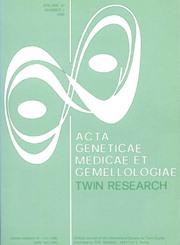Crossref Citations
This article has been cited by the following publications. This list is generated based on data provided by
Crossref.
Grigorenko, Elena L.
and
Carter, Alice S.
1996.
Co-Twin, Peer, and Mother-Child Relationships and I.Q. in a Russian Adolescent Twin Sample.
Journal of Russian & East European Psychology,
Vol. 34,
Issue. 6,
p.
59.
Segal, Nancy L.
and
Senina, Irina N.
2002.
Russian Twin Studies: Colleagues, Controversies, Case Studies and Current Events.
Twin Research,
Vol. 5,
Issue. 1,
p.
53.
Malykh, Sergei B.
Iskoldsky, Nikita V.
and
Gindina, Elena D.
2005.
Genetic analysis of IQ in young adulthood: a Russian twin study.
Personality and Individual Differences,
Vol. 38,
Issue. 6,
p.
1475.
Pearlson, G. D.
and
Folley, B. S.
2007.
Schizophrenia, Psychiatric Genetics, and Darwinian Psychiatry: An Evolutionary Framework.
Schizophrenia Bulletin,
Vol. 34,
Issue. 4,
p.
722.
Kaufman, Allison B.
Kornilov, Sergey A.
Bristol, Adam S.
Tan, Mei
and
Grigorenko, Elena L.
2010.
The Cambridge Handbook of Creativity.
p.
216.
Tan, Mei
and
Grigorenko, Elena L.
2013.
All in the family: Is creative writing familial and heritable?.
Learning and Individual Differences,
Vol. 28,
Issue. ,
p.
177.
Piffer, Davide
and
Hur, Yoon-Mi
2014.
Heritability of Creative Achievement.
Creativity Research Journal,
Vol. 26,
Issue. 2,
p.
151.
Malykh, Sergey
Voronin, Ivan
Ismatullina, Victoria
Zaharov, Ilia
Belova, Alexandra
Lobaskova, Marina
Ivanova, S.V.
and
Nikulchev, E.V.
2016.
Genetic and environmental sources of individual differences in non-verbal intelligence in Russian adolescents.
SHS Web of Conferences,
Vol. 29,
Issue. ,
p.
02026.
Grigorenko, Elena L.
2017.
Creativity and the Genome: The State of Affairs.
The Journal of Creative Behavior,
Vol. 51,
Issue. 4,
p.
327.
Roeling, Mark Patrick
Willemsen, Gonneke
and
Boomsma, Dorret I.
2017.
Heritability of Working in a Creative Profession.
Behavior Genetics,
Vol. 47,
Issue. 3,
p.
298.
Maksimenko, Vladimir A.
Runnova, Anastasia E.
Zhuravlev, Maksim O.
Protasov, Pavel
Kulanin, Roman
Khramova, Marina V.
Pisarchik, Alexander N.
Hramov, Alexander E.
and
Steinborn, Michael B.
2018.
Human personality reflects spatio-temporal and time-frequency EEG structure.
PLOS ONE,
Vol. 13,
Issue. 9,
p.
e0197642.
Selita, Fatos
and
Kovas, Yulia
2019.
GENES AND GINI: WHAT INEQUALITY MEANS FOR HERITABILITY.
Journal of Biosocial Science,
Vol. 51,
Issue. 1,
p.
18.
Park, Seon-Cheol
and
Kim, Yong-Ku
2019.
Frontiers in Psychiatry.
Vol. 1192,
Issue. ,
p.
331.
Ben‐Zaken, Sigal
2020.
Handbook of Sport Psychology.
p.
81.
ZHANG, Shun
YANG, Xiaolei
Ren, Jiawen
and
ZHANG, Jinghuan
2021.
The relationship between methylation of dopamine-related genes, family environment and creativity.
Advances in Psychological Science,
Vol. 29,
Issue. 11,
p.
1911.
Rossiter, John R.
2022.
Creativity in Advertising: How to Test for Highly Creative Individuals, How to Generate Alternative Creative Ideas, and How to Pretest Them.
Journal of Current Issues & Research in Advertising,
Vol. 43,
Issue. 2,
p.
123.
Novaes, Felipe Carvalho
and
Natividade, Jean Carlos
2023.
The sexual selection of creativity: A nomological approach.
Frontiers in Psychology,
Vol. 13,
Issue. ,
Zhang, Shun
Yang, Xiaolei
Zhang, Bozheng
and
Zhang, Jinghuan
2023.
The molecular genetic basis of creativity: a mini review and perspectives.
Psychological Research,
Vol. 87,
Issue. 1,
p.
1.


